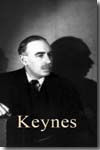Keynes
- ISBN: 9781905791002
- Editorial: TIME LIFE BOOKS
- Fecha de la edición: 2007
- Lugar de la edición: London. Reino Unido
- Encuadernación: Rústica
- Medidas: 24 cm
- Nº Pág.: 167
- Idiomas: Inglés

Keynesianism was arguably the great economic theory of the 20th century. As various economic schools were propounding the virtues of socialism and fascism during the tumultuous post-war years of the 1920s, Keynesianism emerged as a particular style of capitalism, arguing that the economy was determined by aggregate demand. So successful was Keynes' theory that, by the mid 1940s, it was widespread across almost all of Europe's social democracies and, by the 1960s, the United States, too. Keynes' personal life was no less remarkable. He was educated at Eton and Cambridge, where Leonard Woolf and Lytton Strachey helped elect him to the Cambridge Apostles; he amassed a large fortune, almost all of which he lost during the crash of 1929, but from which he quickly recovered; he was instrumental in the founding of the Arts Council of Great Britain, and was subsequently its chairman; he married a Russian ballerina and was 6'6 tall. In 1985, the historian Eric Hobsbawn referred to Keynes as 'one of the most extraordinary Englishmen of his time, or for that matter the history of his country', a summation that, twenty-two years later, still seems wholly appropriate. Though Keynes was a never a radical, he challenged the predominant orthodoxies and assumptions of pre-war economics. Spurred by what he'd witnessed at Versailles, he wrote "The Economic Consequences of the Peace", a book that showcased both his ability to understand economic reality and his acute political acumen. Keynes never saw his life's work fully come to fruition - he died in 1946, aged 63 - but his theories long survived him. From a combination of Keynesianism and classical economics emerged the 'neoclassical synthesis', which came to dominate mainstream macroeconomic thought. His vast influence can be gauged by how, when new economic models were later proposed by Friedman, Hayek and others, their theories were, first and foremost, based on a criticism of Keynesianism.






